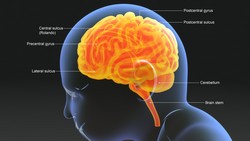Towards healthy brain ageing even before birth
BRAINAGE determined mechanisms linking early human development and brain ageing. BRAINAGE followed a strong gender-related and translational approach by examining effects and mechanisms in rodents and translating findings via non-human primates to humans. BRAINAGE developed innovative markers based on MRI and overall cognitive performance to estimate differences between the biological and the chronological brain age to determine aberrations of brain development and ageing before clinical symptoms become apparent as a base for early preventive measures. Prenatal stress, such as maternal stress, glucocorticoid treatment to enhance fetal lung maturation in preterm labour, and malnutrition, programmes brain development, early cognitive decline and stroke outcome. There are vulnerable phases during pregnancy. Mechanisms underlying the effects of prenatal stress are epigenetic changes of growth hormone and glucocorticoid receptor genes, metabolic changes and increased vascular stiffness. Treatment of rodents with antidepressants that are also prescribed to humans reversed partly effects of prenatal stress.
Keywords
Brain ageing, BRAINAGE, prenatal stress, glucocorticoids, malnutrition







